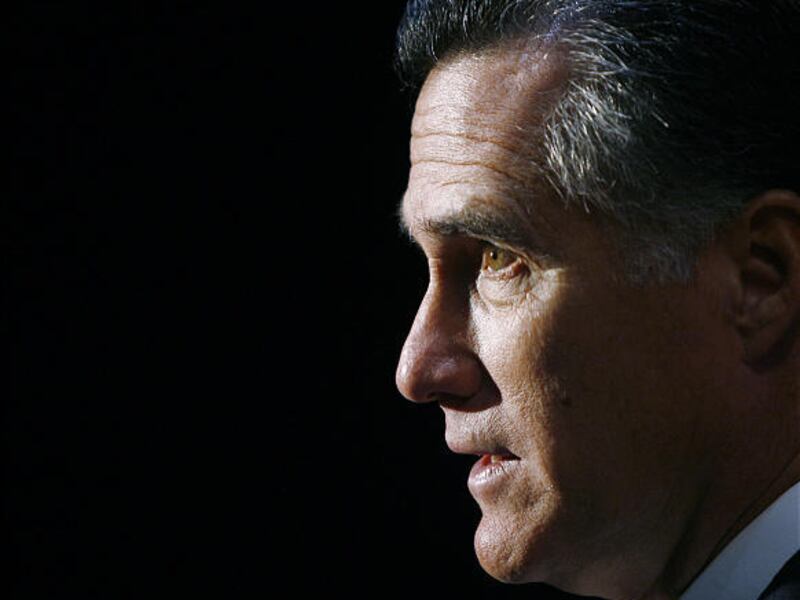About all Mitt Romney could say for certain Tuesday about his future is that he plans to continue working for Republican candidates, at least through next year's mid-term elections.
No, he hasn't decided if he's going to run again for president. No, he's not going to speculate on whether his Mormon faith would be less of an issue in 2012 or what it would be like to face another LDS candidate if Gov. Jon Huntsman Jr. gets in the race.
And no, Romney doesn't know where he and his wife, Ann, will call home once they've sold their Boston-area house, or if they'll ever buy another place in Utah to replace their former vacation villa in Deer Valley.
Romney, who was in Salt Lake City on Tuesday to campaign for Sen. Bob Bennett, R-Utah, said what's important to him now are the upcoming congressional elections.
"When you're in the minority, you band together and you work for those races," he told the Deseret News. "That's what I'm doing."
Some would say Romney, the former leader of the 2002 Winter Olympics in Salt Lake City and a former governor of Massachusetts, is also setting himself up for a second try at the White House by building party ties.
"It's too early to say," he told reporters, suggesting they not read too much into his political activities that include high-profile appearances around the country on behalf of GOP candidates and as a speaker at party events.
Romney said he's "keeping the door open, but I'm just not walking through it. Time will tell what the future holds. It may be a decision I make down the road to become involved. I may make the decision not to become involved in another race."
During an interview with the Deseret News, Romney wouldn't venture a guess on how voters would view his membership in The Church of Jesus Christ of Latter-day Saints in a second national campaign.
He said he had nothing to say about "what might be easier or harder in another race, because I haven't decided about a future race." But he did downplay the role of religion.
"I believe that religion will not be a factor of a significant nature in selecting our nominee, regardless of who might run," Romney said. "In my own case, I won evangelical votes in Michigan, in places like Florida … I know there's a lot of interest in religion, but I don't think for the great majority of Americans that's the deciding factor."
But in other primary contests, Romney did run into trouble with evangelical voters who don't consider Mormons to be fellow Christians. In Iowa, he lost to Baptist minister and former Arkansas Gov. Mike Huckabee, despite having a stronger campaign organization and early leads in the polls.
Romney said Tuesday that there was nothing he would change about the way he handled questions about his Mormonism, calling a speech on faith in America that he gave in late 2007 "one of the high points of the campaign." In that speech, delivered at the George Bush Presidential Library and Museum in Texas, Romney attempted to dispel concerns about the influence of the LDS Church on a Mormon president.
In 2012, though, those issues could resurface, especially if there's more than one LDS candidate with Utah ties in the Republican primary. Huntsman has increasingly been talked about as a presidential contender.
"You know there are going to be other Mormon candidates over the next couple hundred years," Romney said.
Unlike Romney, Huntsman has been talking about the need for the Republican Party to become more moderate. Romney avoided any direct criticism of Huntsman.
"Each individual should express what they believe, and the party can choose," Romney said. "I'm a conservative; there's no question about that."
What Romney isn't, anymore, is a Utahn. He said his Deer Valley house, listed on the market for $5.25 million, has sold. "I'm not cutting my ties; I'm reducing my taxes," he said of selling that and what had been his primary residence in Belmont, Mass.
Although he and his wife, Ann, spend much of their time in a beachfront house purchased last year in La Jolla, Calif., Romney said he has no intention of becoming a permanent resident of that state because of the high taxes.
For now, Romney said he stays at his son Josh's Millcreek home when he comes to Utah. He didn't rule out buying more property in Utah.
"We may. We're just going to wait and see," Romney said.
The decision to scale back was simple, he said. "We owned four homes," including one in New Hampshire. "Our boys are all out of the home. I would have sold one or two homes some time ago, but the Olympics, the governor's office and then the presidential campaign kept me from focusing on that."
He couldn't resist joking that even with four houses, that was still less than the Democratic 2004 presidential candidate, Massachusetts Sen. John Kerry, or the GOP's ultimate choice in 2008, Arizona Sen. John McCain.
McCain was criticized as being out of touch with the economic concerns of Americans during the campaign, when he was unable to say how many houses he had. "I don't know that we finally got a count on his homes," Romney said of his former rival.
His own real estate sell-off wasn't intended to clear the way for another presidential bid, Romney insisted.
"I think people already understand that I had a good deal of income at one point," the former venture capitalist said. "They understand I'm a rich guy. And they got over that."
E-MAIL: lisa@desnews.com


